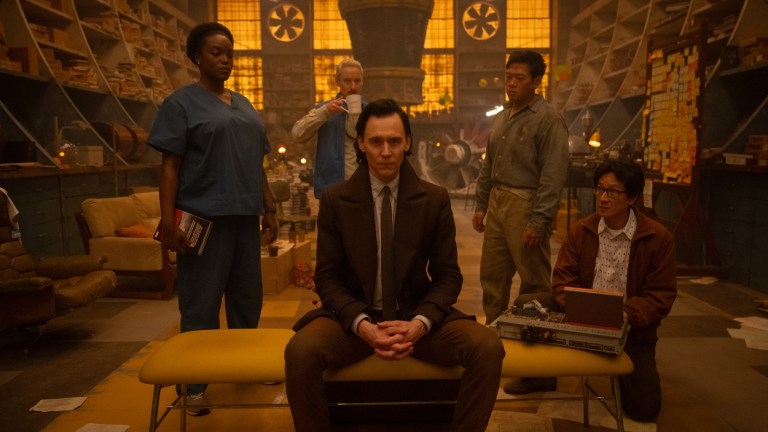Loki Season 2 Episode 5 Review: God of Stories
Loki season two's penultimate episode, "Science/Fiction", is not just the best episode of MCU TV to date, it's one of the best things Marvel has ever done.

This review contains spoilers
Although Loki’s second season has been well received by fans and critics alike, most of the issues with the story so far have been about its nonsensical time travel plot, the scale (and impact) of its dying timelines, and Loki’s somewhat baffling need to save the TVA given that the multiverse is trying to free itself from He Who Remains’ temporal loom. In the penultimate episode of the season, the show deftly addresses all those issues, and forces us to accept that they were never really issues in the first place.
To date, the only real context we have had for new timelines dying has been squiggly lines on a screen, but “Science/Fiction” finally makes them feel real to us. At first, it’s just a McDonald’s meal disappearing from atop Sylvie’s car. Then, Loki’s bourbon vanishes. By the time we get to Sylvie’s favorite record store and meet its owner, the dread has set in. After “Oh! Sweet Nuthin’” by The Velvet Underground plays out over the distressing record store scene, we skip to our TVA friends being turned to ribbons, and we are able to grasp the plight of those being snuffed out. Whole realities are being destroyed, and Sylvie has to admit she was wrong – someone really does have to stop it.
Elsewhere, the episode explores the series’ ludicrous and conflicting time travel rules by mulling whether understanding the “what”, “how”, or “why” of it all even matters, and the answer is perfect on several levels. Yes, abandoning those questions may give us an opportunity to let go of everything that bothered us about the scientific mechanics of Loki, but it also paves the way for the creators behind the show to adapt one of Loki’s best Marvel Comics arcs by turning him from the God of Mischief into the God of Stories, a key redemptive moment for the character in Al Ewing’s Agent of Asgard run. The answer is indeed “who”: Loki doesn’t just have the ability to lie and cause chaos, he can utilize the essence of those abilities to “rewrite” stories as a force for good, turning his lies into reality.
During that time in the character’s history, Loki also made a real friend, and this season of the show also tackles that evolution by having Loki admit that the real reason he wants to save the TVA and the loom so bad is that he doesn’t want to be alone without his friends. People like Mobius and OB have simply become too important to him to lose. It’s still the kind of selfish reason that we can believe Loki has for embarking on this quest, but it also shows some key ways he’s continuing to develop, even in his “good guy” era.
It’s not just Loki who gets important character moments in the episode. We see that Hunter B-15 was originally able to join Loki and Mobius against He Who Remains’ rule because she is the kind of person who can empathise with those who are broken and need help. Mobius finally gets his inevitable jet ski moment, but it also comes with the upsetting knowledge that if he ever found out that He Who Remains had snatched him away from his children, he would likely be heartbroken for all time; always.
Whether it’s these character beats, stressing the “fiction” part of “sci-fi”, or that big reveal for fans of the comics, “Science/Fiction” is a consistently thrilling episode of sci-fi television. Not just the best episode of MCU TV to date in this reviewer’s opinion, but one of the best things Marvel has ever produced. The writing and the cast are on point as always, but we’d be utterly remiss if we didn’t also acknowledge that this installment is an absolute Justin Benson and Aaron Moorhead banger. The beloved indie directing team behind sci-fi gems The Endless and Spring are seemingly in complete creative control here, weaving together a cluster of impressive and fascinating visuals in tandem with Marvel’s (likely bloody overworked) VFX team.
We’ve heard a lot about the MCU being “over” in the past few years. Well, it may be down, but the high standard consistently delivered in Loki this season proves it’s certainly not out. If Marvel can get their shit together, treat their employees right, and concentrate on this kind of quality over quantity in the future, we may just see the MCU pick itself right back up off the mat.
